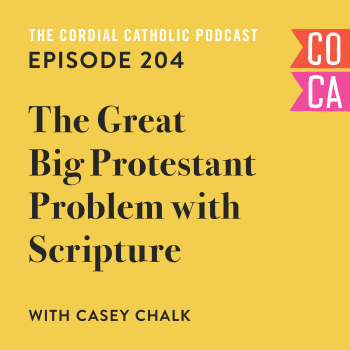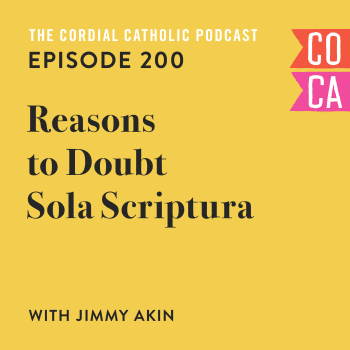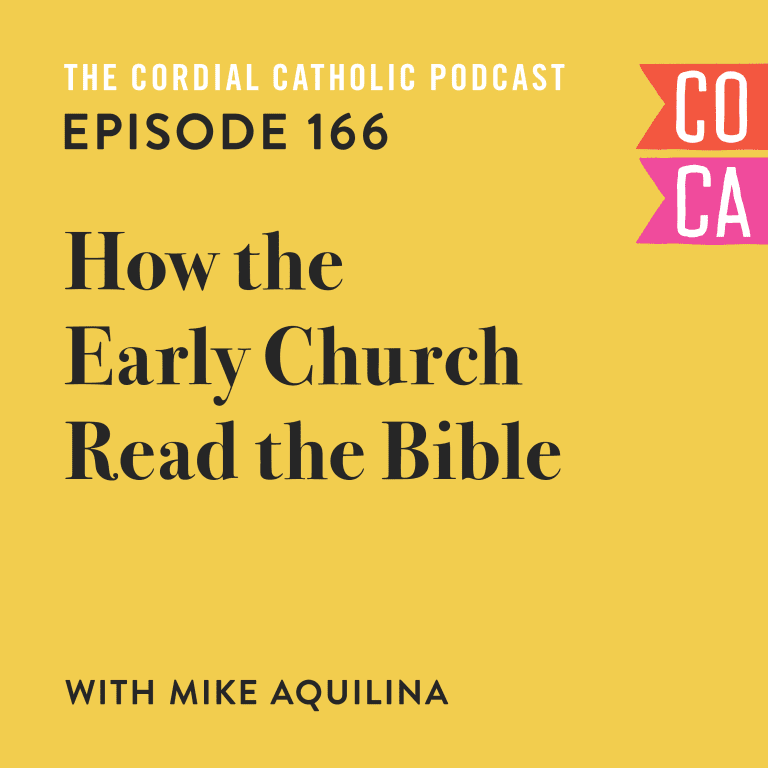
Over on his critically acclaimed blog Standing on My Head, Anglican priest turned Catholic pastor Dwight Longenecker is blowing some new wind into the sails of the sola Scriptura sucks ship.
And the ship is sailin’.
Although that’s not to say that Fr. Longenecker is full of hot air.
Because he’s absolutely right.
As an Evangelical, I came from a tradition that believes that all we need is the Bible—and a good interpretation of it—in order to understand how to be a Christian.
I almost said, “I came from a long-standing tradition” but that wouldn’t be fair, or accurate.
Actually, the Bible Alone theology, which just about every Evangelical wittingly or unwittingly subscribes to is not a “long-standing tradition” but one of alarming recency.
I think few of us Evangelicals ever considered this, or knew it. I certainly had no idea.
But it’s true.
Historically, even Luther and Calvin, the Fathers of the Protestant Reformation, believed that Scripture needed to be interpreted in the context of their own church communities. For Luther, the Lutheran Church. For Calvin, the Reformed. It was these churches which had, and held, the most correct interpretation of Scripture.
The idea that each and every person can interpret the Bible for themselves—and that this was the normative Christian experience—would’ve been utterly shocking to the Early Reformers.
In fact, shockingly, the idea of “Bible Alone” as meaning “me and my Bible” is an idea that is more modern than gunpowder.
Gunpowder.
That’s, uh, fairly recent by my estimation.
As an Evangelical, at this point in my life, I was a bit flummoxed to discover that my normative approach to being a Christian wasn’t normative until about 200 years ago.
And then there’s the problem of biblical interpretation in and of itself. Fr. Longenecker writes,
It is not a single, consistent, cross referenced, totally precise document. It is not a constitution or a legal contract. It is not an agreed rule book for the game or a set of instructions. It is not a neat owner’s manual or a company handbook complete with a set of protocols for every situation.
Problem is: it’s often read that way.
As an Evangelical, when encountering a difficult piece of Scripture that I didn’t understand—say, on the consumption of alcohol, for example—I was told, and believed, that the Holy Spirit would help me in my interpretation.
The Spirit would guide me towards the most accurate understanding of what St. Paul was talking about in his epistles.
But, in practicality, that never happened because amongst my friends and I we held—in those tumultuous and heady days of high school—a myriad of different interpretations.
Despite our best attempts, prayers, and feverish biblical exegesis, we simply couldn’t agree.
And that’s only one example.
For me, the shocking realization that my version of sola Scriptura was actually incredibly recent, coupled with our universal struggles with biblical interpretation, led me to reconsidering my entire outlook on Christianity.
And the floodgates opened.
If “Bible Alone” was intended as the normative approach to the Scriptures then why wasn’t it practiced for nearly 1,800 years?
If “Bible Alone” is the normative approach to Scriptural interpretation why are there so many different interpretations?
If “Bible Alone” was always intended to be how Christians followed Christ what about those that couldn’t, and can’t, read?
And so on, and so on.
When Fr. Longenecker says that Protestants are destroying Christianity he’s certainly got a point. Because when you remove the interpretation of Scripture from the authoritative context in which it was, for the majority of human history, authoritatively interpreted, you got a hodgepodge of competing interpretations.
This is exactly what my Evangelical Christianity did.
But it’s impossible to rightly interpret the Bible on my own—or even with friends.
Even if I become a biblical scholar and spend a lifetime studying context, languages, history, and literary criticism the minute I make what I think is the only possible interpretation of a selection of Scripture out of the woodwork would come an army of equally capable, credentialed, and confident biblical scholars to offer their alternative perspectives.
The thing I ultimately came to understand is that there must be an authoritative faculty that’s able to interpret the Bible. There must be an ultimate authority.
And, no surprise, this is exactly what Jesus left us.
Because He gave, if you recall, the ability to bind and loose, to St. Peter, in particular, and then all of his apostles, in general.
Jesus didn’t leave us a Bible alone with the Holy Spirit as interpreter; Jesus left us with an authoritative body to aid in the understanding of how to live a Christian life. And, not shocking, He promise it would endure until the end of time.
How easily, as an Evangelical, I brushed off these crucial passages and continued to struggle, on my own, to understand my Bible.
But there’s a better way.
Ultimately, it came down to this: If I’m able to interpret my Bible, with the help of the Holy Spirit alone, then I am the Pope.
I am the Pope.
Isn’t that exactly what happens? We make ourselves the infallible interpreter of God’s Word and there’s never what He intended.
Because if I’m the Pope then you’re the Pope, too. Because whose interpretation is correct?
No thanks.
Because for the overwhelming majority of our Christian history the Pope and the Church Councils were the interpreters of Scripture. In a history which traced itself back through the Church Fathers to the very words of Christ—this was the mechanism for understanding our Bibles and our faiths.
Even beyond the Reformation, in the way in which the Early Reformers like Luther and Calvin understood Scripture there was a clear and delineated place for the interpretation of Scripture: in the Church Community.
Our own, modern take on sola Scriptura is fatally flawed and never what was intended by the Reformation. Instead of a meaningful criticism of the power structure of the Catholic Church—which the Reformation was intended to be—we’ve, unfortunately, ended up with a Christianity so fractured that it would be barely recognizable to the Early Reformers, I’m sure.
I don’t, by any means, intend here to heap coals on my time as an Evangelical only to say this: That our understanding of Bible Alone needs to be honestly and painfully examined under the microscope. For me, such a rigorous examination put me on a very particular path. And it’s been incredible.












